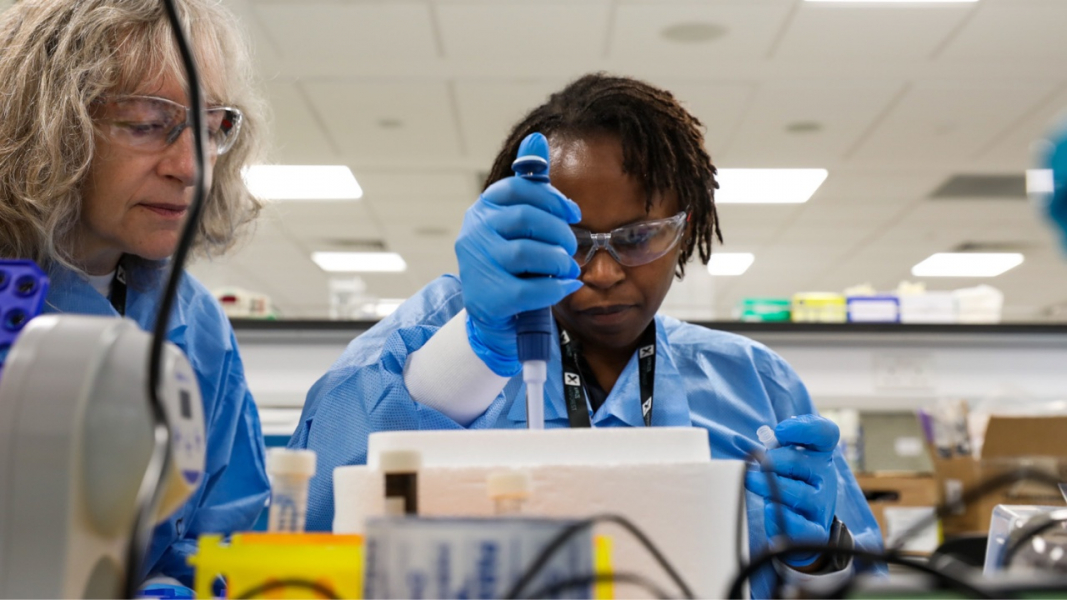Never Stop Exploring
From rainforest travels to lab course facilitation and design, senior BME lab administrator Margaret (Maggie) Gatongi never passes up an opportunity to learn

“My middle name is Wacera. It means, ‘one who likes to travel,’” said Margaret (Maggie) Gatongi, a senior lab administrator for Duke’s Department of Biomedical Engineering (BME). “And I do think the name has been influential. Look at my life—I was born in Kenya, I’ve been to so many other places, and I’m here at Duke now. I love experiencing different regions, countries, cultures—I just love it.”
Her undergraduate degree was in biological sciences with a focus in botany and chemistry, but after a year at an agricultural research institute—her first job out of college—the wanderer in her took the wheel. She joined the monitoring and evaluation division of Kenya Wildlife Services, where she traveled to rural communities with the aim of helping them leverage natural resources to generate income in long-term, sustainable ways, like forming businesses around tourism. For the year she worked with the organization, Gatongi camped and saw parts of Kenya that she never had before, even after growing up in Nairobi.
Once she had tasted adventure, she found the idea of traveling abroad for graduate school alluring. Soon she was packing her bags and heading to Marshall University in West Virginia. As a master’s student, she studied freshwater amoebae that had unexpectedly been found in marine environments, examining their morphological, physiological and molecular characteristics and performing DNA sequencing to see whether they were genetically similar to pathogens. After successfully completing her thesis work, she continued her academic pursuit at Marshall’s Biomedical Sciences program before joining Duke University.
“I’m doing exactly what I want to do.”
Maggie gatongi, Senior Lab Administrator, Duke BME
“As a lab administrator, I have taught and mentored so many students, which is what I love. I’m doing exactly what I want to do,” said Gatongi. “I get really excited about explaining concepts. I especially love the spark on a student’s face when explanations click.”
Not one to call it a day, Gatongi continues to devise ways of making a Duke BME education even more relevant and valuable. She’s in the middle of a qualitative study with BME faculty investigating how students experience the sequence of courses they take and how useful they judge them to be. The aim is to continually refine the sequence to better prepare students for their future careers. She presented the introduction to the study at the ASEE conference in June and plans to follow up with results from the entire study next summer.
In 2022, her enthusiasm and dedication to her students were acknowledged by the Louis L. Imhoff Award for Distinguished Teaching and Mentorship, an award given by Duke Engineering.
Gatongi recently returned from an expedition to Singapore—a destination that was on her bucket list—with Duke’s Blue Devil Forest Divers, where the team of engineers competed in the XPRIZE Rainforest competition. Gatongi was selected to join the team to contribute in efforts to identify insects via DNA sequencing, in a bid to identify more rainforest species than their competitors.

She was asked to accompany the team because she has rich experience in the procedure; her role as a senior lab administrator is to guide and mentor students as they gain the lab skills that they’ll use throughout their time at Duke and beyond. Over the past decade of employment at Duke, she’s taught hundreds of students a slew of technical skills that extend far beyond the baseline of other undergraduate programs.
“Duke BME teaching lab is state-of-the-art,” said Gatongi. “We teach students valuable laboratory techniques including cell culture and how to use equipment such as Open SPR, flow cytometer, and liquid chromatography systems. And in our biotech design class, students learn how these skills can be applied by identifying where there is a need in the industry and thinking about how to address it.” After completing the course, students have requisite technical knowledge and experience in BME, giving them an edge in internships, graduate school and in their future careers, according to Gatongi.
If she can break away from her ice-skating lessons, that is—she recently picked up the sport. “I’m a lifelong learner,” she quipped. “I enjoy getting out of my comfort zone.”
